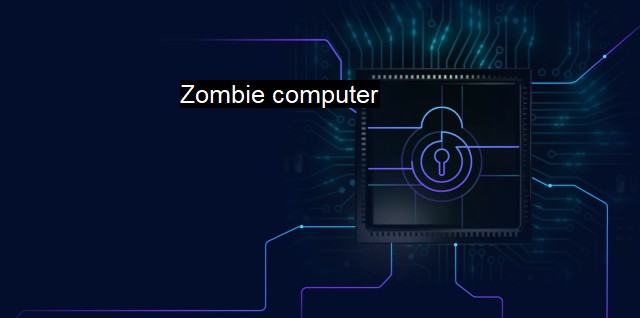What is Zombie computer?
The Threat of Zombie Computers in Cybersecurity: How Hackers Hijack Devices for Massive Attacks and How Antivirus Software Helps Combat Them
In the realm of cybersecurity and antivirus protection, the term 'Zombie computer' might sound a bit unconventional and detached. But understanding what a 'Zombie computer' is crucial to understanding the complexities of cyber threats and malware attacks that can potentially halt a computer's regular functioning.In simple terms, a 'Zombie computer' is a computer that has been essentially hijacked by a hacker or cybercriminal through the use of certain types of malicious software or malware. Upon successful infection, the device falls under the remote control of the attacker. This conversion into a “zombie” readies the system to function as part of a botnet to execute various malicious tasks worldwide.
Botnets are groups of enslaved computers, working together under the control of a hacker or a group of hackers. These 'zombies' and 'botnets' are two fundamental elements in launching large-scale cyberattacks such as distributed denial-of-service (DDoS) attacks. In a DDoS attack, these influenced computers flood a targeted system, server, or network with internet traffic, causing interruption or total shutdown of the target.
'Zombie computers' are also utilized for other malicious tasks such as the distribution of spam emails and phishing campaigns, conveying numerous advertisements or tampering with web traffic to generate fraudulent click counts. Cryptocurrency mining abuse is also a common misuse where zombie computers’ resources are employed to mine cryptocurrencies like Bitcoin.
Given the magnitude of the potential threat, it is crucial to adopt measures to prevent computers from joining the armies of 'Zombies.' Keeping antivirus software updated provides a fundamental protection layer since it can detect and eliminate known malware. The Windows operating system comes with built-in security features such as "Windows Defender," while macOS has "XProtect." sometimes most robust antivirus suites cannot detect and eliminate some sophisticated intrusions occurring across securitized infrastructures, firewalls, antivirus, and intrusion prevention systems.
Next step to be considered is constantly screening your computer for any unusual processing activities. Typically, 'Zombie computers' use up a tremendous amount of processing power and internet bandwidth. Monitoring a computer’s performance can, hence, alert you on potential security issues. Always keep an eye on your Operating System. Windows, for instance, provides the Task Manager, while macOS offers Activity Monitor.
On the flip side, it's vital not to underestimate the potential of end-user knowledge and awareness. An informed and vigilant user can be one of the best security assets. Avoiding clicking on suspicious links, staying away from non-reputable websites, and sticking to download content from trusted sources can be effective in steering clear from unwarranted problems.
Lastly, regular updates of software, antivirus, and operating systems are essential to stay abreast of hired patches from any potential vulnerability. Cybersecurity is a persistent tug of war amongst hackers and security services – while hackers continuously device insightful and innovative methods to hack into systems, security groups find and troubleshoot susceptibilities.
To sum up, Zombie computers pose a significant threat in the realm of cybersecurity. It makes it plausible for hackers to conduct comprehensive malicious activities posing a danger to not just single systems but to extensive networks, corporations, or even countries. Adhering to security practices, maintaining active antivirus software, and staying vigilant helps negate the risks posed by zombie computers, and contributes to the system's overall health.

Zombie computer FAQs
What is a zombie computer?
A zombie computer is a device that has been infected with malware, enabling it to be controlled remotely without the knowledge of the owner. It can be used to carry out various cyber attacks, such as sending spam emails or launching DDoS attacks.How does a computer become a zombie?
Computers become zombies when they are infected with malware, such as a Trojan horse or a virus. The malware allows the attacker to take control of the computer remotely and use it to carry out various malicious activities without the knowledge or consent of the owner.What are the risks of having a zombie computer?
Having a zombie computer can put your personal information and data at risk, as well as those of others. Cybercriminals can use your computer to steal sensitive information, launch attacks on other systems, and spread malware to other devices. This can lead to financial losses and damage to your online reputation.How can I prevent my computer from becoming a zombie?
To prevent your computer from becoming a zombie, it's essential to keep your antivirus and anti-malware software up-to-date and run regular scans. Also, avoid clicking on suspicious links or downloading attachments from unknown sources. Finally, make sure to install operating system and software updates as soon as they become available, as they often contain important security patches.| | A | | | B | | | C | | | D | | | E | | | F | | | G | | | H | | | I | | | J | | | K | | | L | | | M | |
| | N | | | O | | | P | | | Q | | | R | | | S | | | T | | | U | | | V | | | W | | | X | | | Y | | | Z | |
| | 1 | | | 2 | | | 3 | | | 4 | | | 7 | | | 8 | | |||||||